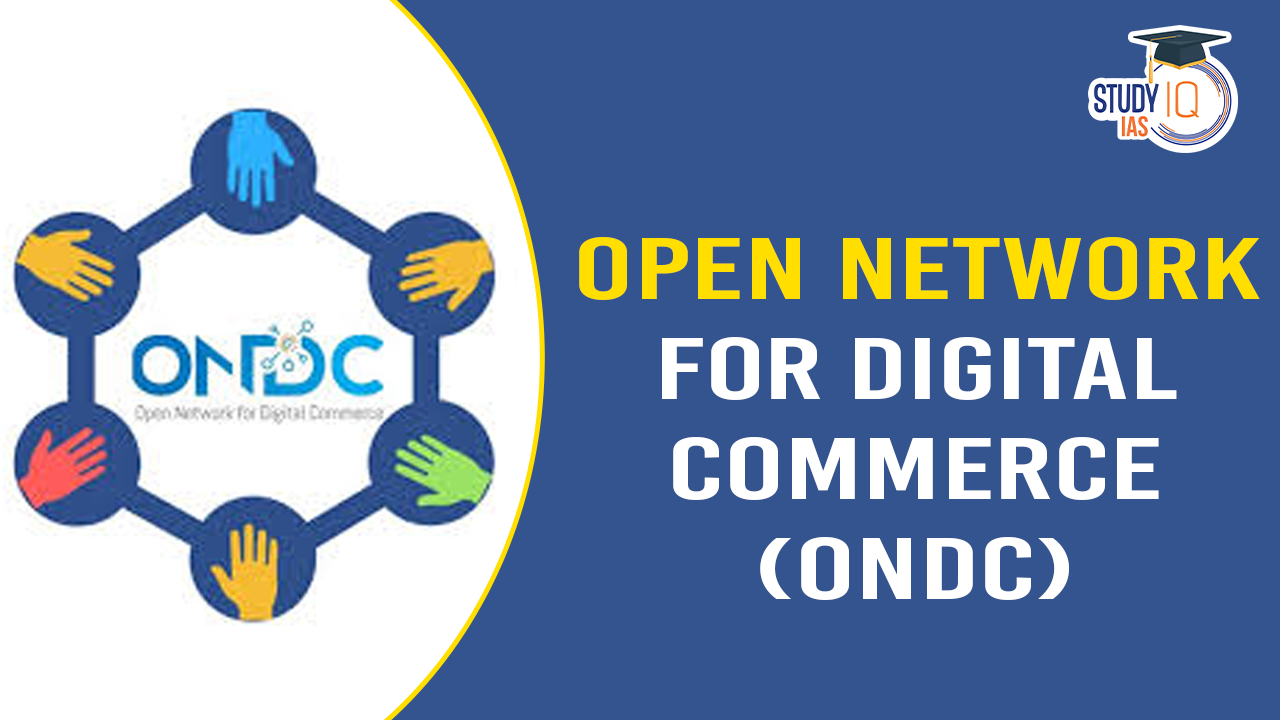Table of Contents
Context: The ONDC (Open Network for Digital Commerce) platform by the government now has over 5 lakh sellers, with more than 70% of them being small or medium-sized enterprises.
Open Network for Digital Commerce (ONDC)
ONDC is an initiative by the Department for Promotion of Industry and Internal Trade (DPIIT) to create an open-source platform that can enable a unified digital commerce ecosystem in the country. It was incorporated as a Section 8 (Non-Profit Organisation under Companies Act 2013) company in December 2021. The Quality Council of India and Protean eGov Technologies Limited are its initial promoters.
| About Open Network for Digital Commerce (ONDC) | |
| Launched | In 2021 by the Department for Promotion of Industry and Internal Trade (DPIIT) under the Ministry of Commerce and Industry. |
| Purpose | ONDC is an open-source network designed to facilitate transactions between buyers and sellers, regardless of the e-commerce platforms they are registered on. |
| Components |
|
| Scope |
|
Aim of ONDC
- Objectives:
- Promote open networks for the exchange of goods and services over digital networks.
- Create new opportunities and reduce digital monopolies.
- Support micro, small, and medium enterprises (MSMEs) and small traders to help them get online.
- Democratisation: Transition digital commerce from a platform-centric model to an open-network model.
Key Features of ONDC
- Open-source platform: It is an open-source platform, which means that the source code is freely available to developers, businesses, and other stakeholders. This allows for greater collaboration and innovation and ensures that the platform is adaptable to changing market needs.
- Interoperability: Under ONDC, it is envisaged that a buyer registered on one participating e-commerce site (for example, Amazon) may purchase goods from a seller on another participating e-commerce site (for example, Flipkart).
- Voluntary Adoption and Inclusivity: It is neither an aggregator application nor a hosting platform, and all existing digital commerce applications and platforms can voluntarily choose to adopt and be a part of the ONDC network.
- Not-for-Profit: It is a not-for-profit organization that will offer a network to enable local digital commerce stores across industries to be discovered and engaged by any network-enabled applications.
- On the lines of UPI: Implementation of ONDC, which is expected to be on the lines of the Unified Payments Interface (UPI) could bring various operational aspects put in place by e-commerce platforms to the same level.
- Logistics and supply chain management: The ONDC platform will support a range of logistics and supply chain management services, including real-time tracking and tracing of shipments, inventory management, and order fulfilment.
Benefits of ONDC
- Opportunities for Small Retailers: Provides small retailers the chance to offer their services and goods to buyers nationwide through an e-commerce system.
- Merchant Data: This enables merchants to save their data, build credit history, and reach more consumers.
- Digitization and Inclusion: Expected to digitise the entire value chain, promote supplier inclusion, improve logistics efficiency, and enhance consumer value.
- Standardisation: ONDC protocols will standardise operations such as cataloguing, inventory management, order management, and order fulfilment.
Significance of ONDC in India
- Ending monopolistic tendencies: ONDC will lower entry barriers for local businesses and create a level playing field for the e-commerce landscape, currently dominated by players like Amazon and Flipkart.
- Enhancement of value for consumers: Consumers can potentially discover any seller, product or service by using any compatible application or platform. This will increase freedom of choice for consumers.
- Moving away from an operator-driven platform-centric model: Consolidating most of the trade of digital commerce in one platform creates concentration risk. It can also lead to exclusion and discretionary behaviour, limiting the choice and freedom of the buyers and sellers.
- Formalizing local businesses: Around 1.2 crore hyperlocal merchants (Kirana) account for 80% of the retail sector in India, with 90% of them being unorganized, or self-organized.
- ONDCs can help in their formalization by creating an active digital history and enabling easier access to finance options.
- Encouraging widespread participation of MSMEs: ONDC can help lower entry barriers for Micro, Small and Medium Enterprises (MSMEs) that have the potential to flourish with innovative sales and marketing efforts.
- Growth and Development: ONDC will enable economic development and livelihood creation opportunities across the digital commerce value chain i.e., logistics, packaging, last-mile delivery, etc.
Potential Challenges in Implementing ONDC
- Reluctance from major e-commerce players: Major players in the e-commerce industry, such as Amazon and Flipkart, have shown reluctance to join the ONDC. These platforms have already established their systems and infrastructure, and joining the ONDC may require significant changes and investments.
- Existing freedom and competition: Critics argue that sellers already have the freedom to list their products on multiple e-commerce platforms, and buyers have the option to shop across platforms. They believe that the current e-commerce model allows for competition and choice, negating the need for a separate open network like the ONDC.
- Impact on quality of services: Critics argue that e-commerce platforms invest in several services to provide a seamless and efficient experience for customers. If the ONDC rules prevent platforms from benefiting from such investments, it may negatively impact the quality of services and overall customer experience.
- Grievance redressal: A decentralized system can lead to a lack of clarity over who shoulders the responsibility for customer service and redressal in case of grievances.
- Difficulties in ensuring compatibility and interoperability of the existing platforms/applications of the buyers and seller.
- Limited technical capability of local businesses and MSMEs to be onboarded on the digital network.
- Privacy and security concerns: Such an open network may lead to a collection of personal data which may have privacy issues and its open nature may expose it to hackers.
- Competition from big players: Local businesses will find it extremely challenging to compete with the discounts, sales and other lucrative offers, being offered by prominent e-commerce players.
Way Forward
- Balanced approach: Striking a balance between promoting fair competition and maintaining the quality of services is crucial for the success of the Open Network for Digital Commerce (ONDC).
- Incentives for participation: Incentives can help encourage participation and drive adoption among both major platforms and smaller sellers.
- Technical support and standardization: Provide technical assistance and support to e-commerce platforms and sellers for seamless integration with the ONDC.
- Regulatory framework and oversight: Develop a comprehensive regulatory framework to govern the ONDC, ensuring fair competition, consumer protection, and prevention of anti-competitive practices.
- Data privacy and security measures: Prioritize robust data privacy and security measures within the ONDC framework. Building trust in the security and privacy of the ONDC platform is crucial for its widespread adoption


 Employment Linked Scheme (ELS), Objectiv...
Employment Linked Scheme (ELS), Objectiv...
 Sukanya Samriddhi Yojana, Features, Elig...
Sukanya Samriddhi Yojana, Features, Elig...
 Poshan Abhiyaan, POSHAN 2.0, Features an...
Poshan Abhiyaan, POSHAN 2.0, Features an...





















